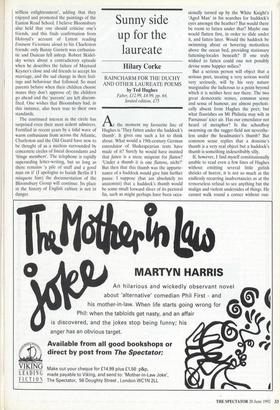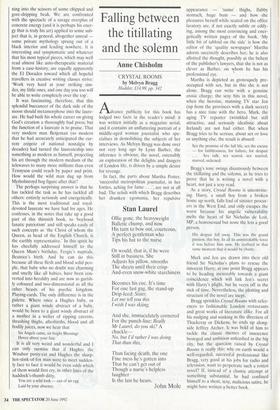Sunny side up for the laureate
Hilary Corke
RAINCHARM FOR THE DUCHY AND OTHER LAUREATE POEMS by Ted Hughes Faber, £12.99, f4.99, pp. 64, limited edition, £75 At the moment my favourite line of Hughes is 'They fatten under the haddock's thumb'. It gives one such a lot to think about. What would a 19th-century German emendator of Shakespearian texts have made of it? Surely he would have insisted that fatten is a mere misprint for flatten? 'Under a thumb it is one flattens, nicht?' But then that this thumb was the appurte- nance of a haddock would give him further pause. I suppose (but am absolutely no anatomist) that a haddock's thumb would be some small forward sliver of its pectoral fin, such as might perhaps have been occa-
sionally turned up by the White Knight's 'Aged Man' in his searches for haddock's eyes amongst the heather? But would there be room to fatten under that? Maybe one would flatten first, in order to slide under it, and fatten later. Would the haddock be swimming about or hovering motionless above the ocean bed, providing stationary fattening-locales beneath? If one truly wished to fatten could one not possibly devise some happier milieu?
But a serious person will object that a serious poet, treating a very serious world very seriously, will by his very nature marginalise the ludicrous to a point beyond which it is neither here nor there. The two great democratic senses, common sense and sense of humour, are almost psychoti- cally absent from Hughes the poet; but what flourishes on Mt Philistia may wilt in Parnassus' icier air. Has our emendator not heard of metaphor? Is the schoolboy swarming on the rugger-field not neverthe- less under the headmaster's thumb? But common sense replies that a dominie's thumb is a very real object but a haddock's thumb is something indescribably silly.
If, however, I find myself constitutionally unable to read even a few lines of Hughes without emitting several little girlish shrieks of horror, it is not so much at the endlessly recurring inadvertancies as at the remorseless refusal to see anything but the malign and violent undersides of things. He cannot walk round a corner without run-
fling into the scissors of some chipped and gore-dripping beak. We are confronted with the spectacle of a savage overplus of concrete energy (and it is perhaps his ener- gy that is truly his art) applied to some sub- ject that is, in general, altogether unreal — some private mythology sprung out of a black interior and leading nowhere. It is interesting and symptomatic and whatever that his most typical pieces, which may well read almost like auto-therapeutic material from a case-history, are equally apparently the El Dorados toward which all hopeful travellers in creative writing classes strive: `Work very hard at your striking sim- iles, my little ones, and one day you too will be able to write completely over the top'.
It was fascinating, therefore, that this splendid buccaneer of the dark side of the moon should metamorphose into the laure- ate. He had built his whole career on giving God's creation a thoroughly bad press; but the function of a laureate is to praise. That very modern man Betjeman (so modern that he had accurately anticipated the cur- rent zeitgeist of national nostalgia by decades) had turned the laureateship into something as modern as himself, projecting his art through the modern medium of the telewaves to many more millions than even Tennyson could reach by paper and print. How would the wild man dug up from Mytholmroyd bog figure after that?
The perhaps surprising answer is that he has tackled the task as he has tackled all others: entirely seriously and energetically. This is the most traditional and royal- devoted laureate we have had for ages. He confesses, in the notes that take up a good part of this thinnish book, to `boyhood fanatic patriotism' and still speaks easily of such concepts as 'the Christ of whom the Queen, as head of the English Church, is the earthly representative.' In this spirit he has cheefully addressed himself to the Queen Mum's birthday, Fergie's nuptials, Beatrice's birth. And he can do this because all these flesh and blood solid peo- ple, that baby who no doubt was charming and smelly like all babies, have been con- verted into heraldry and are now as garish- ly coloured and two-dimensional as all the other beasts of his psychic kingdom. Playing-cards. The only difference is in the palette. Where once a Hughes baby, or rather a giant windy abstract of a baby, would be born to a giant windy abstract of a mother in a welter of ripping caverns, thrashing thighs, afterbirths, blood and all bodily juices, now we hear that
Six Angels came, six bright Blessings Hover above your fate.
It is all very weird and wonderful and I can only surmise that if Hughes the Windsor pussy-cat and Hughes the sharp- hot-stink-of-fox man were to meet sudden- ly face to face it would he even odds which of them would first cry, in other lines of the haddock's-thumb ditty,
You are a wild look — out of an egg
Laid by your absence.



























































 Previous page
Previous page